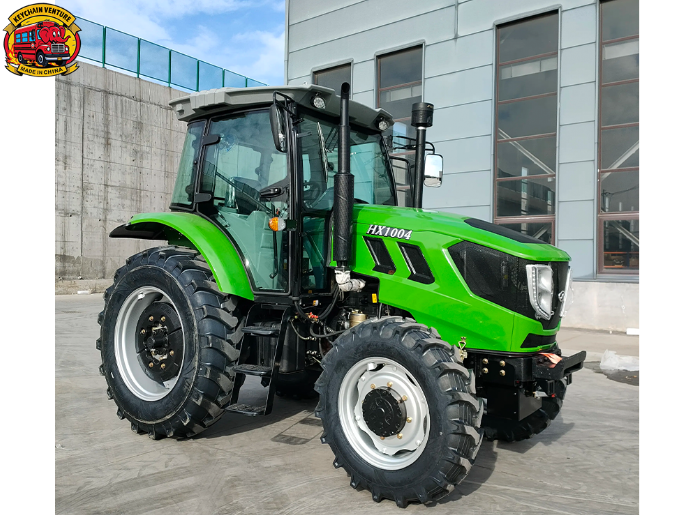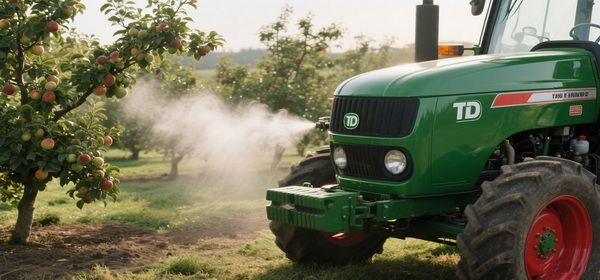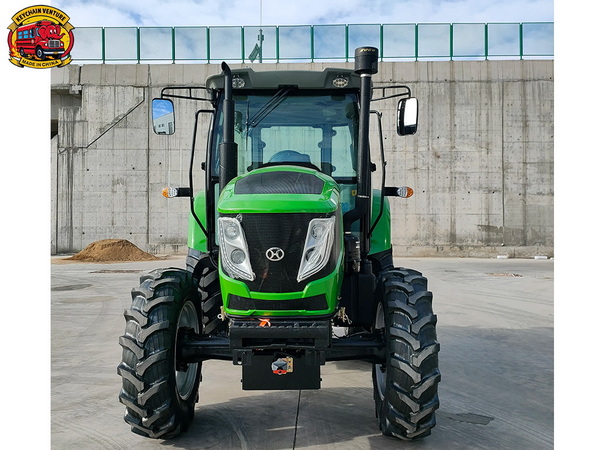Views: 222 Author: Amanda Publish Time: 2025-10-25 Origin: Site








Content Menu
● Understanding the Used Tractor Market
>> Changing Buyer Demographics
● Benefits of Purchasing a Used Tractor
>> Immediate Access to Equipment
>> Technology and Brand Choices
● Steps to Secure a Used Tractor
>> Step 1: Define Equipment Needs
>> Step 2: Research and Select Vendors
>> Step 4: Examine Service Records
>> Step 5: Negotiate Effectively
>> Step 6: Verify Documentation
>> Step 7: Complete Purchase and Delivery
● Key Challenges When Buying a Used Tractor
>> Potential Mechanical Issues
>> Fraud and Misrepresentation
● Best Practices for Buyers and Sellers
>> Build Relationships with Trusted Suppliers
>> Consider Technology Upgrades
>> Engine and Transmission Evaluation
● Exporting Used Tractors Internationally
● The Role of Technology in Deal Making
● Maintenance Strategies for Used Tractors
● Sustainability and Used Tractors
● Maximizing Operational Efficiency with Used Tractors
>> Adaptability
● Case Study: Successful Used Tractor Acquisition
● Frequently Asked Questions (FAQ)
>> 1. How can I determine a fair price for a used tractor?
>> 2. What documents are needed to conclude a used tractor purchase?
>> 3. Do used tractors come with any warranty?
>> 4. Can I export or import used tractors between countries?
>> 5. What risks should I avoid when buying a used tractor online?
Navigating the process of acquiring a used tractor is a strategic move for businesses and individuals seeking reliable heavy machinery with reduced investment costs. For suppliers like KeyChain Venture Co., Ltd., one of China's leading commercial vehicle providers, offering high-performance solutions in buses and heavy trucks — including used tractors — is paramount to meeting the evolving needs of both domestic and international clients. This article provides an exhaustive guide to every aspect of dealing for a used tractor, from defining requirements and conducting inspections to mastering negotiations, handling documentation, and ensuring future maintenance and resale value. The insights below aim to equip buyers and sellers with practical tips and the latest market trends for successful transactions.

A used tractor refers to an agricultural or commercial vehicle that has had previous owners and operational history. These tractors are widely available via dealerships, private sellers, online marketplaces, and government auctions, offering flexibility and affordability compared to new vehicles.
The used tractor market has been expanding, driven by global demand for economical machinery, increased mechanization in agriculture, and the rapid scaling of infrastructure projects. In China, and beyond, businesses turn to used tractors to navigate budget constraints while still achieving operational efficiency and reliability.
With a growing number of mid-sized and small-scale enterprises entering agricultural and logistics sectors, the buyer base for used tractors is diversifying. This trend fuels competition and introduces more choice in make, model, and technical specifications, as suppliers like KeyChain Venture continue to broaden their offerings.
Used tractors offer substantial reductions in upfront costs, allowing buyers to retain capital for other investments or operational expenses.
Unlike the wait times associated with custom orders of new tractors, used tractors are typically available for immediate acquisition, streamlining operations and project launches.
The market value of a used tractor typically depreciates at a slower rate than that of a new tractor, making resale a more viable option when business needs evolve.
Buyers can select from a broader array of models and brands, enabling tailored solutions for diverse operating conditions. This flexibility means there's likely a used tractor that matches even the most specific requirements.
Begin with a clear assessment of the machinery's intended role, desired horsepower, transmission options, size, and compatibility with various implements. List crucial features such as hydraulic capacity, fuel economy, year of manufacture, and brand preferences. Specify whether the tractor is for agriculture, construction, transport, or another application.
Investigate trustworthy suppliers and dealerships, emphasizing those with robust reputations for transparency and after-sales support. KeyChain Venture Co., Ltd. stands out for its thorough documentation and international expertise in handling heavy vehicles, making them a prime choice for both domestic and overseas buyers.
A comprehensive inspection is vital. Check all critical systems — engine, transmission, hydraulics, tires, and brakes — for signs of wear, performance issues, or hidden damage. Verify the tractor's operational safety via test drives and mechanical assessments, ideally by a certified technician.
Request detailed maintenance and repair histories from the seller. Consistent service reports and genuine replacement parts are indicators of long-term reliability. Poor documentation may point to higher future maintenance risks and should be considered a red flag.
Armed with inspection data and market research, approach negotiations with a clear idea of fair market value. Factor in depreciation, special features, and any necessary repairs or upgrades. Secure flexible payment terms when possible, and ensure every agreement is documented before any funds change hands.
Before completing the deal, meticulously review the tractor's title, registration, previous inspection certificates, and insurance documents. International transactions should also address shipping logistics, licensing, and customs clearance, ensuring every regulatory requirement is met.
Finalize payment through secure channels and arrange professional transport, whether local or international. Engage reputable logistics services to minimize risk during transit and delivery, especially for overseas shipments.

Used tractors may have unresolved wear, outdated technology, or parts nearing end-of-life. Pre-purchase inspection and post-sale warranty coverage help mitigate these risks.
Online listings can occasionally be misleading. Buy from accredited suppliers known for transparency, and never finalize a purchase without direct inspection or third-party verification.
Incomplete paperwork can expose buyers to legal and operational complications. Always consult legal professionals and cross-check documentation before concluding the transaction.
Assess the availability of spare parts, repair services, and after-sales guarantees. Reliable vendors should offer ongoing technical support for maintenance or troubleshooting.
Long-term partnerships with companies like KeyChain Venture ensure reliable access to equipment, maintenance resources, and timely support.
Schedule regular servicing of your used tractor, tracking mileage, repairs, and part replacements. Proactive maintenance extends the tractor's usable life and maintains performance levels.
Modernizing older models with new attachments, electronics, and safety features can add utility and value. Discuss possible upgrades with your supplier to find solutions compatible with your tractor's make and model.
Resale value is maximized by maintaining thorough service records, upgrading high-wear systems, and preserving original documentation. Sellers who follow these practices generally secure better prices in the secondary market.
Operational tests should assess power output, fuel efficiency, noise levels, and gear shifts. Look out for leaks, excessive smoke, or uncharacteristic engine sounds.
Inspect hydraulic lines, fluid reservoirs, and the lifting mechanisms for leaks or sponginess. Functionality tests can determine the system's ability to handle attachments smoothly.
Examine tire treads, sidewalls, and suspension for signs of excessive wear, cracks, or misalignment.
Review the interior cabin, checking for operational comfort, ergonomics, control panel responsiveness, and visibility.
Selling or purchasing used tractors between countries demands attention to:
- International transport logistics
- Export/import licensing
- Customs paperwork and taxation
- Compliance with destination regulations and equipment standards
KeyChain Venture Co., Ltd. specializes in these procedures, supporting clients with tailored documentation and customs guidance.
Online marketplaces and digital business platforms, such as those used by major suppliers, have streamlined deal negotiations. Buyers and sellers access real-time inventory, request virtual inspections, and receive instant support using digital tools. Embracing e-commerce solutions can enhance efficiency and transparency in the used tractor market.
Implement regular check-ups for engine performance, hydraulic pressure, and safety features. Scheduled maintenance ensures compliance with operating standards and helps evade unexpected breakdowns.
Insist on authentic replacement parts for all maintenance interventions. This preserves the efficiency and value of your used tractor over time, while reducing risks associated with counterfeit or low-quality components.
Ensure your maintenance personnel are well trained in both the technical and safety aspects of the specific tractor brands in your fleet. Ongoing education helps anticipate and resolve mechanical issues proactively.
Embracing used tractors contributes to sustainability by extending the useful life of existing machinery. This reduces waste and lowers the carbon footprint associated with manufacturing new vehicles, aligning with global environmental goals.
Carefully track service records, operating hours, and maintenance schedules for each tractor in your fleet. Modern fleet management tools, combined with supplier support, optimize usage and reduce downtime.
Select tractors with adjustable implements and multi-function compatibility. This maximizes your investment by allowing deployment in various roles — from tilling and harvesting to hauling and construction.
Monitor operational performance metrics (fuel efficiency, uptime, output rates) to adjust your fleet strategy over time, maintaining profitability and output standards.
A regional logistics company decided to expand its fleet by purchasing eight used tractors from KeyChain Venture Co., Ltd. The client conducted market research, detailed equipment inspections, and negotiated flexible payment terms. With comprehensive documentation and international shipping support, the company secured machines that immediately increased operational capacity and reduced costs. This transaction serves as a model for combining due diligence, supplier partnership, and operational foresight for optimal outcomes.
Purchasing a used tractor requires methodical planning, from outlining specific needs and vetting potential suppliers to inspecting machinery and verifying comprehensive documentation. By following these steps and establishing relationships with reputable vendors like KeyChain Venture Co., Ltd., buyers dramatically improve their chances of securing reliable, high-performance equipment with favorable cost structures. The right approach also prepares businesses to maintain, upgrade, and potentially resell their tractors in the future, ensuring long-term operational sustainability and growth.

Research current market rates for the make, model, and year in question. Confirmation with multiple reputable dealers and online platforms aids in formulating a realistic budget for negotiation.
Essential paperwork includes ownership title, past registration, service logs, inspection certificates, and — for international deals — export/import licenses and customs forms.
Some credible suppliers, including KeyChain Venture Co., Ltd., provide limited warranties and after-sales assistance for select units. Always clarify warranty conditions before proceeding with the deal.
Yes, subject to transportation, customs clearance, technical compliance, and destination-specific regulations. Work with established export agencies and confirm all requirements ahead of shipment.
Potential risks include dealing with fraudulent sellers, overlooking mechanical defects, and incomplete documentation. To minimize these, buy from trusted vendors, request pre-purchase inspections, and thoroughly verify paperwork.